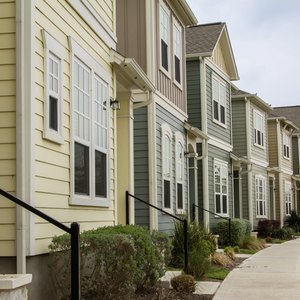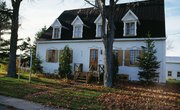
Buying a home is usually a time-consuming and pricey endeavor. Due to different housing types, property features and price differences, you have to do some homework before making a decision. Condominiums and detached houses offer unique advantages and disadvantages. Making the right choice entails taking stock of your lifestyle, budget and location needs, as well as your desire for space, privacy, ease of maintenance and amenities.
Differentiating the Two
A traditional detached home includes land, or a lot, as well as a structure. A condo buyer owns only the space inside a condo unit -- no land -- and shares ownership of common areas, such as parking structures, hallways and recreational facilities. "Condominium" is a form of ownership, not a type of dwelling. A detached house can actually be deemed a "condo" if neighbors share ownership of certain property features. These house types are typically referred to as townhouses and planned unit development homes, or "PUDs." A typical condo in general is characterized by shared walls, roofs and exterior space.
Helpful House Features
Owners of houses are usually allowed to change their property without worrying about neighborhood rules and standards. Unless a detached house is subject to a homeowners association, or HOA, aesthetics such as paint color and landscaping are solely up to the owner. House owners can remodel, build room additions and convert rooms in accordance with zoning and permit ordinances. Houses are more likely to have front yards and back yards because they sit on individual lots. A house generally offers more privacy, and noise travels less easily from neighboring houses due to lot size and the distance between homes. Houses may also appreciate faster than condos because they come with land, which also increases in value over time.
Pricey Problems
Prices of houses are generally more expensive than prices of condos with the same square footage, number of rooms and location. Owners pay for interior and exterior repairs and maintenance. Homeowners are also responsible for seasonal maintenance such as landscaping, snow removal and services such as trash disposal. A house may also entail a longer commute to a city or urban core, as builders tend to concentrate detached houses in suburban areas.
Giving Condos Their Due
Retirees, first-time homebuyers, buyers who want to downsize and buyers who generally don't want extensive property maintenance, may prefer a condo. Price ranges for condos can vary widely, with more available at lower prices. Condos can offer the security or sense of community that comes with having neighbors nearby. Condo buildings may also have security gates, guards and other safety features that owners collectively pay through condo or HOA dues. Urban condos are concentrated near city life, employment and more attractions. Condos may contain luxurious amenities such as doormen and concierge service, also covered by dues.
Condo Catches
Condo owners automatically become members of the governing HOA and must follow covenants, conditions and restrictions, or CC&Rs. These rules limit a condo's use and appearance. For example, a condo HOA may bar certain pets, exterior paint colors and monitor parking use. Condo rules, which vary by building and state law, may be too restrictive for certain buyers. Condos entail regularly scheduled dues that cover common-area maintenance and services. HOAs may also levy special assessments to cover other expenses. When owners don't pay their share, other owners may have to pick up the slack via fee hikes. The proximity of neighbors from adjoining units may also limit privacy and add to noise disturbances.
References
Writer Bio
As a long-time newspaper reporter and staff writer, Kay Bosworth covered real estate development and business for publications in northern New Jersey. Her extensive career included serving as editor of a business education magazine for the McGraw-Hill Book Company. The Kentucky native earned a BA from Transylvania University in Lexington.

